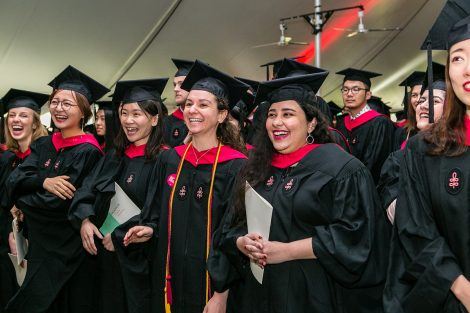May 29, 2019—“Break out of your comfort zones. Immerse yourselves in new environments. Get your hands dirty. Talk directly with the people you wish to serve—and listen,” Dean Michelle Williams told the 2019 graduates at Harvard T.H. Chan School of Public Health’s Convocation ceremony on May 29. “That will allow you to observe things you’d never see from afar, to understand things you never could from a distance. That’s how you’ll go from academic to advocate.”
Cecile Richards, former president of Planned Parenthood Federation of America and co-founder of the new women’s political action group Supermajority, echoed the theme in her keynote address to students and their guests gathered under a big tent on the Harvard Medical School Quadrangle. At a time when Missouri may soon become the first state in 46 years to lose access to safe, legal abortion, Richards said, “It is just not enough to be public health experts. You need to be advocates and you need to be truth-tellers.”
The Harvard Chan School ceremony is called a “convocation” instead of “commencement” in recognition of the fact that Harvard University doesn’t officially confer degrees until Commencement exercises on May 30 in Cambridge.
Walking across the stage today were 606 students, who will earn the following degrees: doctor of philosophy, doctor of public health, doctor of science, master in health care management, master of public health, master of science, and master of arts. Graduates came from 55 countries and 37 U.S. states plus the District of Columbia, and 365 were women.
At a reception the evening before Convocation, awards were presented to graduating students, faculty, and staff members.
Connection to the land
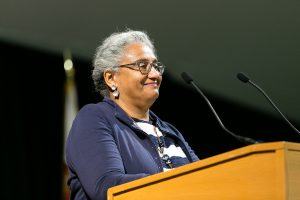
Elizabeth Solomon, assistant director of academic affairs and fellowship programs for Harvard Chan School’s Department of Social and Behavioral Sciences and a member of the Massachusett Tribe at Ponkapoag, opened Convocation with an acknowledgment that the event was taking place on native space. By doing so, non-native communities can “honor the native peoples who belong to the land, and recognize that use of the land by others is a result of the displacement of the land’s original holders,” she said.
She urged the audience to consider what it would mean to go beyond merely acknowledging native space, and the inseparable connection that native people have to their traditional land. She said, “It means living as if other lives are dependent upon your actions, because they are.”
Real wisdom comes from life experiences
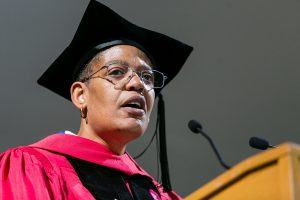
Williams noted that it was exactly 100 years ago this spring that Alice Hamilton, a renowned industrial health expert, was named an assistant professor of industrial medicine at Harvard Medical School. (In the 1920s, Hamilton’s department became a part of Harvard School of Public Health.) She was the first female faculty member in University history, at a time when Harvard didn’t even admit female students.
Although she was restricted in her academic life—Hamilton was barred from visiting the Faculty Club, participating in academic ceremonies, and from getting faculty tickets to Harvard football games—in her professional life, Hamilton went wherever she could be of use. That included low-income communities, where she educated mothers about infectious disease prevention, and factories, where she investigated dangerous manufacturing practices in industries like rubber and explosives. She went to the places where the people who she wanted to help were, because she knew that real wisdom comes from life experiences, said Williams.
“That realization—that you have to truly understand the lived experience of other people in order to make a difference in their lives—became the north star that guided her remarkable career,” Williams said. Hamilton’s research and advocacy helped to shape scores of state and federal workplace safety policies, including the landmark Occupational Safety and Health Act of 1970, which was signed into law three months after she died at age 101.
Her legacy continues to be felt on campus, Williams said. Among examples she cited was the work of Diana Ceballos, a research scientist in the Department of Environmental Health who is investigating hazard exposure in a variety of industries, and teaches a class in which students publish content about occupational hazards on Wikipedia.
Williams also highlighted two graduating students: Jasmine Hall, SM ’19, whose passion for understanding what drives—and what damages—mental and neurological health was sparked by the drinking water crisis in her hometown of Flint, Michigan, and Angel Rosario, MPH ’19, whose goal is to eliminate health disparities by working to make health systems more equitable.
Watch a video of Dean Williams’ remarks
Imagine a healthier country
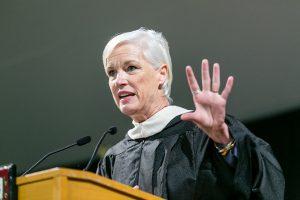
Richards told graduates that they won’t have the luxury of staying out of politics, because the biggest hurdles to providing equitable access to health care tend to be political—as the recent abortion restriction efforts in a number of states demonstrate.
“It’s impossible to overstate the difference it makes when the public health community stands with the people who are counting on you,” Richards said. She urged graduates to build movements across race, gender, sexual orientation, and income to fight for health equity, and for men as well as women to speak out about abortion. It’s about the fundamental right of people to make their own health care decisions, she said, and that affects everyone.
Richards said that it is time to do more than resist; it’s time to build a healthier country that makes public health issues like maternal mortality, gun violence, and clean air and water a priority.
Recalling that past public health successes once seemed impossible, Richards said, “Even though it might not seem like it right now, I know we have what it takes to do all of this and more.”
Watch a video of Cecile Richards’ remarks
Four sticks
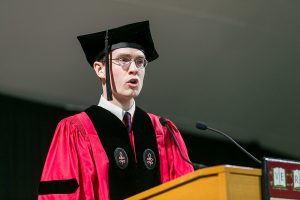
The student speaker was Eric Mooring, who is receiving an SD degree in epidemiology. He told the audience that he was inspired by a Winter Session field course he took in Fortaleza, Brazil, last year. There, the class visited a community health and social development center named Quatro Varas—or “four sticks”—after a folk tale. The moral of the story is that sticks on their own may break, but bound together they are strong. This is true in public health, Mooring said. The public’s health is shaped by many factors, from genes to economic and social forces; therefore, an intervention or policy will be stronger if it comes out of insights from experts in a variety of disciplines.
However, Mooring cautioned, “Let’s never forget that people are experts on their own lives, their own communities, and their own values and priorities.” In public health, there is a risk that practitioners see only the problems in communities facing heavy burdens, not their strengths, he said. “Working together—with each other and with the public—we will advance the public’s health, far more than we could do alone.”
Watch a video of Eric Moorings’ remarks
‘Never give up’
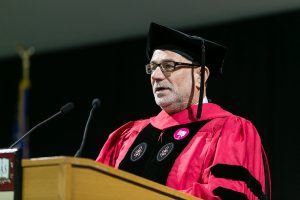
Harvard Chan School Alumni Association President M. Rashad Massoud, MPH ’93, a physician and public health specialist, welcomed graduates to the alumni community. Massoud currently serves as director of the USAID Applying Science to Strengthen and Improve Systems Project and is senior vice president of the Quality and Performance Institute at University Research Company, an international organization that provides solutions to health and social challenges worldwide.
Massoud said that when he was working as a primary care physician early in his career, he was able to institute improvements at his clinic that greatly reduced unnecessary physician visits. Patients and doctors loved the changes, but when he tried to have them implemented across his system, he was told by leadership to roll them back. Despite this setback, he was inspired to continue working for health care improvement, and later, in other roles, was able to implement changes at a much broader scale.
He told graduates that while they will face obstacles and disappointments in their career, “do not let that take you off-track or reduce your ambition. Never give up on what you believe in.”
Watch a video of M. Rashad Massoud’s remarks
Photos: Josh Levine
Additional coverage
Commencement 2019 (Cambridge): Photo gallery
Convocation 2019: Photo gallery
Convocation 2019: Award ceremony photo gallery
Convocation 2019: Award ceremony
Convocation 2019: Dean Michelle Williams address
Convocation 2019: Cecile Richards address
“The Path of Most Resistance” (Coverage of Cecile Richards’ address by Harvard Magazine)
Convocation 2019: Student speaker Eric Mooring address
Convocation 2019: Alumni Council President M. Rashad Massoud address
